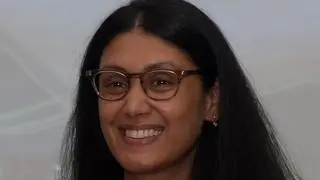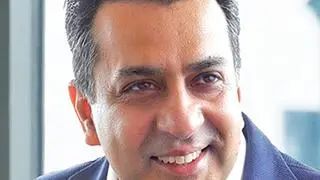There is a chance for technology to reframe the challenge of illiteracy that India is facing by leveraging the use of audio as a technology tool, said Nitin Paranjpe, Chief Operating Officer, Unilever. He was speaking at the Nasscom Technology & Leadership Forum on Wednesday on the topic ‘Reimagining of future of work: Powered by cloud, data, and security.’
Illiteracy means people cannot contribute economically, and have to lead lives of poverty, he said. The technology that we have today with audio as a tool can completely change the way we think of what literacy is, he said. “You don't have to read and write to be literate. I can listen. I can listen and therefore I can grow intellectually, emotionally, if I'm able to hear. And if people in this industry start thinking in terms of providing inputs to educate people using this (audio) as a medium, I think it could be transformational.”
Voice commands
So many people are already using voice commands on platforms like WhatsApp, he pointed out. “If you can think of it a little more strategically, as to how can we leverage this aspect, so that no person is ever left behind... And just because you missed the opportunity when you were growing up, you don't have to miss it into the future. You can still leverage the native intellect that people have got, with the tools that we are able to provide. And that could be the opportunity for your industry (technology) and for the country going forward.”
India can also seize the opportunity of skilling and reskilling, said Paranjpe. “You need to constantly reskill people — not (just) the 25-year-olds. But people like me who are 55-plus or 60 plus. The reality is, life expectancy is rising. The notion of conventional retirement is of the past, but skills need to be updated.”
Diversity is also something people can embrace, he said. “Inclusion, bringing in people with totally different ways of thinking, will become more and more important in a world where very varied and different problems will strike you.”
Expectations from business
Another change that can possibly take place would be society’s expectations from businesses. “I suspect successful businesses of the future will be the ones which will put societal needs and interests front and centre, and find a way to demonstrate that, and go back to how business actually started: business started to solve societal needs. When you did a great job, society rewarded you in the way of making profits. That’s how this started,” he explained.
“Unfortunately, business schools have taught us wrongly, I believe, that the purpose of business is shareholder wealth maximisation. The outcome of a great business’ shareholder wealth maximisation; the purpose is still to serve societal needs,” said Paranjpe.
Connecting with people
Communication has been democratised amid the pandemic, with it becoming devoid of hierarchy, he said. “We are now exploring new ways of communicating. It is possible for the chief executive to reach out to 150,000 employees every week, if he or she wishes to do that… We discovered the power of connecting with everyone. We've democratised communication, we have made it hierarchy-less.”
Technology will be the driving force of everything that's going to take place, and all organisations will have to embrace digitisation in ways that we have not imagined before, he said “But it is about reimagining how business could be done in the context of the technology which exists...the companies which do that quickly, fast and leverage it, will be winners.”








Comments
Comments have to be in English, and in full sentences. They cannot be abusive or personal. Please abide by our community guidelines for posting your comments.
We have migrated to a new commenting platform. If you are already a registered user of TheHindu Businessline and logged in, you may continue to engage with our articles. If you do not have an account please register and login to post comments. Users can access their older comments by logging into their accounts on Vuukle.